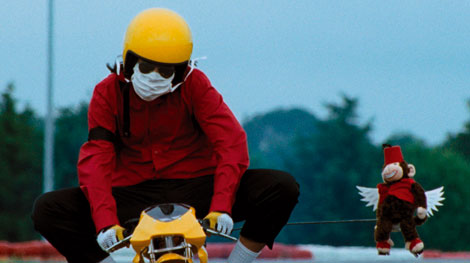
book by André Batista, Rodrigo Pimentel, Luiz Eduardo Soares
screenplay by Bráulio Mantovani, José Padilha, Rodrigo Pimentel
directed by José Padilha
USA, Brazil; 2007
Elite Squad, the winner of Berlin's Golden Bear award this year, is told from the perspective of a special forces police captain in Rio de Janeiro's inner city. The BOPE carry assault rifles, have skulls tattooed on their arms, and are called in to raid Rio's favelas—shanty towns—when violent crime overwhelms the regular police. The setting is similar to 2002's' City of God, though far less glossy and cinematic, offering (if you can imagine) an even sharper depiction of what violence is like in that sprawling megalopolis. But if City of God had anything to do with awareness, this one has something to do with offering a solution, however difficult. COG's most important point was that an endemic community is of the highest value, despite its socio-economic difficulties. Much of the literature and intellectual architecture that surrounds Latin and South America in the last half-century centralizes around this concept. Thus, the left-leaning response to such meddling manifestations as CIA-backed dictatorships and oligarchical Banana Republics is described in Padilha's film as bureaucratic and corrupt, because social problems remain. In Padilha's Rio, revolutionary thought comes from the right of the political spectrum. It's a funny concept to Americans, whose power systems since the '80's have been shifting ever rightward, and current revolutionaries fit the traditional leftist model.
The film is an example of where the art house meets the frat house. It takes a visceral, instinctual audience to appreciate this worldview. In order to elicit the response, though, Padilha is forced to use the traditional tools of narrative cinema, and in this he pulls no punches. The torture and death scenes are unrelenting, and the hand-held proximity of the action is nauseating. The plot is long, winding, and hinges on some over-used contrivances to keep it in gear. The story, on the other hand, is simplistic and dull. It's good guys versus bad guys. Why is it that every time major studio money is involved (because the Weinsteins are majors now, right?), quality is lost? Also, why are elite American power brokers (the Weinsteins, Hollywood, et al.) funding right-wing projects in resource-rich countries? Sound familiar?
The major failure isn't even in the filmmaking, it is that Padilha's intellectual platform is entirely faulty. His brand of societal order is based on bloodlust rather than belief, as the BOPE training camp creates mindless death machines, not ideologues. Later sequences featuring BOPE's infiltration of the favela are reminiscent of the media that filters in from Iraq. Soldiers bash down doors during starving families' dinners, and torture practices involving pain and humiliation destroy hearts and minds instead of capturing them. This death squad's eventual success is the revenge-driven assassination of a two-bit drug hood, nothing more and nothing less. There is no belief involved. A police state is an artificial institution that attacks everything that is different from itself. There is only one system in a police state, and it is an imposed one. Also, because it is a system based on suppression, it requires dystopia to survive. How could such an institution identify and ameliorate problems like rich-poor gaps and violence-based capitalism? You gotta have crooks to have cops.


























